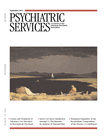Substance Use and First-Episode Psychosis
Substance use and abuse frequently complicate a first episode of psychosis. The ways in which substance use affects the treatment of psychosis may be critical to the resolution of the first episode and may influence the course of psychosis and its treatment in the future. However, few studies have focused on substance use and treatment strategies for young adults with psychosis. In this issue, Wisdom and colleagues take an important step forward by reviewing the literature on changes in substance use after treatment for psychosis among individuals who receive and who do not receive specialized substance abuse treatment.
In addition to what the review tells us about the course of substance use after a first episode of psychosis, it shines a light on the limitations of our knowledge. For example, although many individuals stop drinking or using drugs after a first episode, probably due in part to the belief that their substance use is somehow related to or a cause of the psychosis, the longer-term implications of this belief are unclear. Would a person who abstains from substance use and who experiences another episode of psychosis reconsider his or her substance-using behavior? In addition, it is unclear whether assessment and diagnosis of substance use and abuse require tailoring for young adults with psychosis; research on assessment methods and measures in this population is lacking. Given the relatively recent development of effective treatment strategies for the general adult population with comorbid psychotic and substance use disorders, it is not surprising that the literature on young adults is even leaner. Critical information about how to identify young adults with psychosis who are most in need of additional treatment for substance abuse is not available.
Much can be learned about these topics from the extensive literature on substance use and abuse among adolescents and young adults without psychosis. Studies have explored how substance use, assessment, and diagnosis differ between the young adult and the adult populations. Researchers have defined different types of drinking and drug use—such as binge drinking—that are more prevalent among youths. Studies have also identified predictors of heavy substance use or problem use, including individual characteristics (personality factors and expectancies), family characteristics (family history of substance use and parental vigilance), and peer characteristics (peer norms and involvement in substance use). Researchers have developed and tested strategies for motivating youths to participate in substance abuse treatment and have studied the efficacy of treatment strategies, such as behavioral and family therapy. This literature will provide directions for research and will identify promising strategies for assessment and treatment of young adults who are experiencing a first episode of psychosis.



